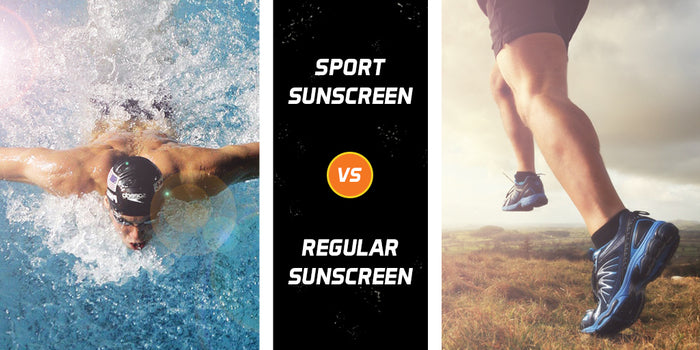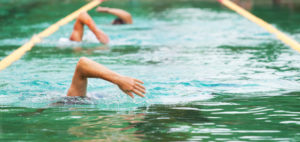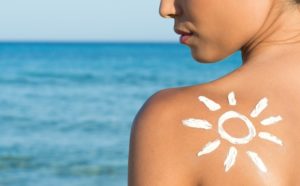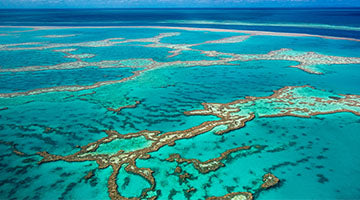Differences Between Sport Sunscreen vs. Regular Sunscreen

Sport sunscreen vs. regular sunscreen. It's a common comparison that can carries some misconceptions.
In short, there are many characteristics that define sport sunscreen vs. regular sunscreen. Sport sunscreen offers enduring SPF protection compared to most regular sunscreens. But that's not all. Below are a few more reasons why you might want consider sport sunscreen over regular sunscreen products.

Not All Regular Sunscreens Offer Broad-Spectrum Protection
There are two primary types of UV light that can harm your skin — UVA and UVB. A broad-spectrum sunscreen protects you from both. According to Mayo Clinic:
"UVA rays can prematurely age your skin, causing wrinkling and age spots. UVB rays can burn your skin. Too much exposure to UVA or UVB rays can cause skin cancer. The best sunscreen offers protection from all UV light."
While it's common for most sport sunscreen formulas to be broad-spectrum, not all regular sunscreens offer this line of defense against UVA and UVB rays. For this reason alone, it's highly advised to use a broad-spectrum sunscreen to ensure complete protection against the sun.
Sport Sunscreens Are A Win For Prolonged Water Immersion
 Unlike regular sunscreen, sport sunscreens are usually tested to measure how water resistant a formula is before its Sun Protection Factor (SPF) starts to wear off. While such testing is tailored for prolonged water immersion, such as sunscreen for swimmers, it can also reflect sweat resistance.
Unlike regular sunscreen, sport sunscreens are usually tested to measure how water resistant a formula is before its Sun Protection Factor (SPF) starts to wear off. While such testing is tailored for prolonged water immersion, such as sunscreen for swimmers, it can also reflect sweat resistance.
As defined by Mayo Clinic, "the term water resistant means that the SPF is maintained for up to 40 minutes while swimming or sweating. Very water resistant means the SPF is maintained for 80 minutes."
Here at SolRX, we teamed-up with AMA Testing Labs to design a trial that would measure the performance of our WATERBLOCK® formula (the basis to our sport sunscreen products.) After testing the formula, AMA Labs confirmed our sports sunscreen to be water resistant for over 8 hours. This test defined our WATERBLOCK® products as some of the best sports sunscreen for water immersion.
Some Sport Sunscreens Offer Easier Applications Vs. Regular Sunscreens
 There are many different types, or applications, of sunscreen. Some of the advantages and disadvantages of using different applications include:
There are many different types, or applications, of sunscreen. Some of the advantages and disadvantages of using different applications include:
- Sticks - Sunscreen sticks, such as zinc oxide sunscreen sticks, are useful for quick application, particularly around the face and eyes.
- Creams - Cream sunscreens often contain moisture-rich qualities making them ideal for dry skin
- Lotions - While lotions might take longer to rub-in and absorb into the skin, they are often preferred for application on large parts of the body that need more coverage. Lotion sunscreens also tend to be less greasy compared to creams.
- Gel - Although less common, gel sunscreen works best in hairy areas, making them good options for men.
- Spray - Popular among parents because they're easy to apply on children, spray sunscreens are a convenient option found in both sport sunscreen and regular sunscreen products. Because it's difficult to determine how thorough you're applying a spray sunscreen, apply a liberal and even coating.
Sports Sunscreens Are Often More Eco-friendly & Reef Safe
Whether you plan to go surfing or just hit beach, many individuals are conscious of the environmental impact that some sunscreens can have. A recently released report claims that most regular sunscreen is damaging the ocean's coral reefs, impacting the reefs ability to cope with fluctuating climate change and other environmental issues. That's why countless sunscreen producers are designing products that are eco-friendly and reef safe.

Most of these sunscreen manufacturers, like SolRX, design sport-specific sunscreen for individuals who are active around oceans and other natural bodies of water. In fact, SolRX products have been tested by the industry's leading provider of SPF waterproof testing. The science-based results show that it is impossible for SolRX sunscreen to deposit on the reef if it is on the skin.
Like many of the best sports sunscreens, SolRX formula remains on the individual for 8 hours and sustains 97% or more of its SPF protection that entire time. This translates to no deleterious effect to the our ocean's reefs and the environment as a whole.
 Sport Sunscreen vs. Regular Sunscreen: The Last Word
Sport Sunscreen vs. Regular Sunscreen: The Last Word
In addition to athletes, sport sunscreen is often an appropriate option for anyone looking to get wet, work-up a sweat, or enjoy several hours of sun exposure. Offering more advanced, broad-spectrum protection capabilities, a good sport sunscreen is often the better choice versus regular sport sunscreen.


 Sport Sunscreen vs. Regular Sunscreen: The Last Word
Sport Sunscreen vs. Regular Sunscreen: The Last Word

